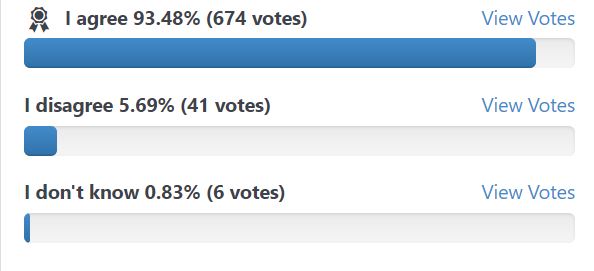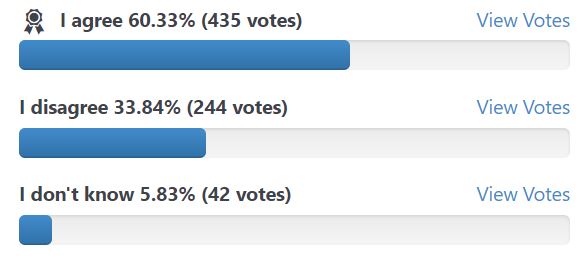Yesterday’s poll of EYE readers in relation to how agents should treat the advertising of properties that have gone under offer/sstc drew a big response of over 720 votes, and provides some surprising results.
Whilst we acknowledge that the poll is far from scientific, it does provide a snapshot of opinions and insight into what readers think is good agency practice – or not.
Contrary to what might have been expected in some quarters, an overwhelming majority of respondents agreed that when a property goes under offer/sstc that fact should be clearly shown on all advertisements, sales details and portal listings.
As to whether the general public has a clear understanding of the term ‘sold subject to contract’, the almost even split in the vote should perhaps be a source of some concern.
The old debate about whether ‘Under Offer’ should be used in preference to’Sold, subject to contract’ brought this 2:1 response:
EYE asked James Munro, Senior Manager of the National Trading Standards Estate and Letting Agency Teams, for his opinion and we received the following:
“A property remains for sale and open to offers until exchange of contracts – unless the seller agrees (or has previously agreed) that the marketing should cease and the property be withdrawn from sale.
“Agents are under a duty to continue passing on offers until they have instructions in writing from the seller to the contrary.
“In an ideal world the agent should update the listing when a property goes to sstc and instructions are received from their client to state that ‘no further offers are being accepted on this property’.
“Being open and transparent about the process is essential for agents to maintain the trust of their clients and customers.
“A failure to update property listings can lead to frustration on both sides, wastes time through unnecessary enquiries, and can put agents at risk of ombudsman complaints or enforcement action.”
National Trading Standards has published guidance on the use of terms in property listings.
In that guidance certain terms are defined:
‘Under offer’ – used when an offer has been received which is under consideration by the vendor, but the property is normally still on the market (i.e. further offers may be made dependent upon the vendor’s written instructions) – the description should only be used until the offer is accepted or declined, as the case may be.
‘Sale agreed’ – used when an offer has been accepted by the seller, but (for example) contracts may not have been prepared or the buyer may not be in a final position to proceed. The property may or may not still be on the market, i.e. further offers may be made dependent upon the seller’s written instructions. The seller’s decision on future marketing is material information in this context and should be clearly stated on property listings to avoid any confusion amongst potential buyers. This description may be used until the property is sold or the sale falls through, as the case may be.
‘Sold subject to contract’ – relates to a property on which an offer has been accepted by the seller and the sales process is complete, subject to contracts being exchanged. The seller should be asked to confirm whether or not the property should continue to be marketed for sale, and this decision should be clearly stated on property listings, as above. This description may be used until the property is sold or the sale falls through, as the case may be.
‘Sold subject to conclusion of missives’ (in Scotland) – an offer has been accepted but the sale has not been concluded – the property should no longer be marketed for sale. In rare cases the sale may still fall through, hence the use of this description.
‘Sold’ – contracts have been exchanged and the sale is completed – the property must no longer be marketed for sale. ‘Sold’ property listings should be removed in line with portal requirements and/or relevant codes of practice (e.g. RICS UK Residential Real Estate Agency 6th edition, the Property Ombudsman code of practice for residential sales, etc.)




“The effort by the consumer in calling to have their time wasted is enough to justify a prosecution” David Smith, JMW Solicitors
You must be logged in to like or dislike this comments.
Click to login
Don't have an account? Click here to register
“effort”…
You must be logged in to like or dislike this comments.
Click to login
Don't have an account? Click here to register
The only person who doesn’t understand the terms and process are the public. The agent acts for the seller and takes their instructions and based on that information they are required to respond accordingly to the above guidelines.
SSTC is incorrectly used by some as a ‘cover all scenario’s’. Which agent doesn’t know that and is more to do with some agents wishing to show off their ability to gain more instructions.
A property is never sold until it completes. I have never found a vendor not want to have a back-up in the wings if it goes pear shaped. Buyers are the first to complain if on the end of a collapsing chain.
If the property does complete “Sold” is an advert on property you have no instructions to market!
You must be logged in to like or dislike this comments.
Click to login
Don't have an account? Click here to register
A property is never sold until it EXCHANGES. That is the legal definition of sold. It doesn’t help that agents keep putting “sold STC” after a property has exchanged contracts which is a contradiction and misleading under CPRs and dates from the badly drafted board legislation some 25 years ago.
You must be logged in to like or dislike this comments.
Click to login
Don't have an account? Click here to register
I’m being pedantic, but I don’t believe it’s correct to say a property is never sold until exchange. If a prospective buyer makes an offer without stating it is subject to contract, and the seller accepts that offer in a signed letter or email, without them stating the sale is subject to contract, then UK contract law dictates that a legally binding sale has been formed. Regardless of whether conveyancers are involved and contracts exchanged, a contract of sale has been formed and if either party attempts to withdraw from the transaction they can be sued by the opposite side. This I’m sure was tested in court, and if memory serves the seller was forced to sell his property because he sent an email accepting an ‘unconditional’ offer.
A property is only sold at exchange when it can been agreed that the sale is ‘subject to contract’. This is why it is imperative that estate agents include the condition on all their correspondence – it’s to protect them and their customers.
You must be logged in to like or dislike this comments.
Click to login
Don't have an account? Click here to register
Even if the above is correct, surely the lack of any financial consideration having been paid by the potential buyer to the seller would make any written exchange of intentions unenforceable?
You must be logged in to like or dislike this comments.
Click to login
Don't have an account? Click here to register
I’m no solicitor, but I assume the consideration is the promise to transfer ownership of the property (upon payment received).
You must be logged in to like or dislike this comments.
Click to login
Don't have an account? Click here to register
I’m trying to get some clarity on this. Can you remember if the case was Neocleous and Rees 2019?
You must be logged in to like or dislike this comments.
Click to login
Don't have an account? Click here to register
I don’t think that was the case, but I couldn’t find another example in a quick Google search.
You must be logged in to like or dislike this comments.
Click to login
Don't have an account? Click here to register
Did you get any clarity on this?
You must be logged in to like or dislike this comments.
Click to login
Don't have an account? Click here to register
Working on it. I will make sure I am 100% and will get back to PIE next week.
You must be logged in to like or dislike this comments.
Click to login
Don't have an account? Click here to register